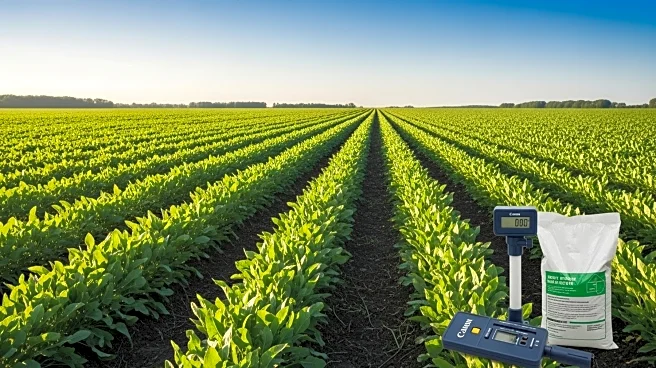What's Happening?
ADM and Kellanova have successfully completed a two-year initiative aimed at improving soil health and supporting farmers in the Southeast United States. The program focused on regenerative agriculture practices across 120,000 acres of cotton farms in Alabama, Florida, and Georgia. These practices included planting cover crops and reduced tillage, which help protect and enhance natural resources such as soil, water, and biodiversity. The initiative resulted in significant environmental benefits, including a reduction of greenhouse gas emissions by 16,000 metric tons and the sequestration of 42,000 metric tons of carbon in the soil. Additionally, farmers achieved an 85% score on the program’s habitat potential index, indicating high opportunities for biodiversity.
Why It's Important?
This initiative is crucial for promoting sustainable agriculture and enhancing the resilience of the U.S. agricultural sector. By adopting regenerative practices, farmers can improve soil health, reduce emissions, and increase biodiversity, which are essential for long-term agricultural productivity and environmental sustainability. The program also supports the livelihoods of farmers, including members of the National Black Growers Council, by providing them with the tools and knowledge to implement sustainable practices. This collaboration between ADM and Kellanova demonstrates a commitment to building resilient food systems and meeting consumer demand for sustainably sourced products.
What's Next?
ADM plans to expand its regenerative agriculture efforts globally, aiming to cover 5 million acres by 2024. The continued partnership with Kellanova and other stakeholders will likely focus on further enhancing sustainable value chains and supporting farmer livelihoods. As the program progresses, it may serve as a model for other regions and industries looking to implement regenerative agriculture practices.
Beyond the Headlines
The initiative highlights the growing importance of corporate responsibility in addressing environmental challenges. By investing in regenerative agriculture, companies like ADM and Kellanova are not only improving their supply chains but also contributing to broader climate goals. This approach may influence other businesses to adopt similar practices, potentially leading to widespread changes in agricultural and environmental policies.










